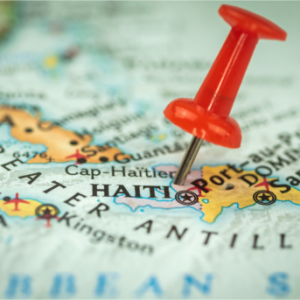Haiti, a decisive choice for the United States : The United States faces unpleasant or unpromising options when it comes to helping Haiti
Par James B. Foley
Sunday, July 25, 2021 ((rezonodwes.com)) – The shocking assassination of Haitian President Jovenel Moïse raises urgent questions about the country’s future and has serious implications for the United States. As Haiti descends deeper and deeper into chaos, we must have a realistic understanding of its long history of political turmoil, to better grasp the situation in which it finds itself.
Of all the things we must wrestle with, none is more important than this: the options facing Washington and the international community when it comes to helping bring stability and some development to Haiti are unpromising or unpleasant. We must therefore focus on what is truly achievable in the face of Haitian realities and the limited capabilities of the United States.
There is no doubt that foreign powers bear responsibility for the root causes of many of Haiti’s contemporary ills. : from the country’s brutal history as a slave colony of France, to its imposition by France of a crushing indemnity and its treatment in the United States for much of the 19th century. Under such circumstances, it is no wonder that Haiti has failed to develop functioning government institutions and the rule of law.
The other consequence of Haiti’s tragic past has been an incessant struggle for power in a chronic deficit of political legitimacy.. The cycle has repeated itself throughout Haitian history: leaders rise and fall, many meeting a violent end. They govern arbitrarily and sometimes tyrannically, considering their adversaries as seditious. Opposition forces distrust leaders and often turn to rebellion. No one accepts the legitimacy of the other. Politics is zero-sum.
Since the 1950s, Haiti has been caught in a downward vortex, with poverty, overpopulation, environmental devastation and lawlessness gradually outpacing the state’s capabilities decade by decade. However bad the situation may be at any given moment, it is invariably on the path to something worse. Which brings us to the present, with armed criminal gangs terrorizing the population, and political actors and institutions now completely devoid of authority – the assassinated president, his recently deceased constitutional successor, the defunct legislature, and successive interim prime ministers. uncertain status.
The United States has intervened in Haiti several times over the past century, beginning in 1915 with a nearly 20-year occupation of the country by U.S. Marines.
My experience as U.S. ambassador to Haiti reflected this pattern. I arrived in Port-au-Prince in September 2003, when Jean-Bertrand Aristide was midway through a difficult second term as president. The political opposition refused to accept his legitimacy and demanded his resignation; he was also rejected by a wide range of civil society groups alienated by the violent tactics of his supporters. The president himself, while still a symbolic champion of Haiti’s impoverished masses, had evidently returned from exile a decade earlier cynical about governing but determined to survive according to the traditional rules of Haitian politics.
He quickly made a shell of the Haitian National Police, which the United States had helped professionalize at great cost, by putting rogue loyalists in command and filling its ranks with former gang members. Like many of his predecessors, he turned to criminal street gangs for political muscle, which ultimately became the mainstay of his regime. According to the U.S. Drug Enforcement Administration, the Haitian government was also complicit at the highest levels with drug traffickers.
While I was in Haiti, Aristide resisted meaningful reforms, no doubt fearing that severing ties with gangs and reducing political violence would jeopardize his hold on power. In our meetings, he would invariably insert a strange reference to Florida in a way meant to suggest its capacity to cause a migration crisis, a clear warning to the United States to back off. The opposition, for its part, was just as intransigent. In dozens of meetings with government and opposition politicians, not once have I heard any of them raise or wish to discuss any of Haiti’s major problems. Perhaps the assumption was that nothing could be done; the emphasis has always been and only on the struggle for power.
Before my arrival, the expectation among the Haitian opposition and elite was that the Bush administration would soon act unilaterally to realize its dream of ousting Aristide. And that is what has actually happened to date, according to Aristide and his supporters. However, I can say categorically that there was no support in Washington at the time for any intervention or involvement in Haiti. My instructions were above all to prevent any crisis that could trigger mass migration.
When the reality that the United States would not intervene, elements of the opposition and the business community apparently decided to take matters into their own hands by joining forces with exiled former Haitian military personnel to launch a rebellion army, which began in February 2004. As they approached Port-au-Prince and chaos mounted in the capital, I aimed to dissuade Aristide from unleashing his supporters to commit mass violence. At the same time, I sought to maneuver to prevent rebel forces and their invisible backers from seizing power and starting their own bloodbath. Aristide then deployed his ultimate weapon: appearing to encourage Haitians to flee the country, triggering a large-scale boat exodus that instantly focused minds in Washington. When this gamble was blocked by the brutal interdiction of migrant boats by U.S. Coast Guard vessels, Aristide asked the United States to arrange for his safe departure (which he later called a kidnapping) . Within hours, the first members of an international stabilization force led by U.S. Marines arrived, barely defeating the rebels in the city and preventing them from taking power.
Our initial hopes that a period of peace and stability provided by a significant international security presence would give Haiti breathing space to begin confronting its many challenges did not survive the rapid withdrawal of the US-led force. United four months later. Although the subsequent United Nations peacekeeping mission was unable to prevent a resurgence of violence, it provided enough support to the Haitian National Police to keep outright anarchy at bay. The UN’s decision to completely end this mission in 2019 was therefore fraught with risks, as we see today.
The current situation has similarities to the one I faced in 2004, but in some ways it is worse. Then as now, there was no consensus on political legitimacy, and violence ensued. But in 2004, a sitting president of the Haitian Supreme Court, after Aristide’s resignation, assumed the presidency legally, in accordance with the Haitian constitution. Today, the country suffers from a vacuum of legal authority.
Haiti is once again on the brink, confronting Washington with a decision on whether or not to send troops, as the previous interim prime minister had requested. There is no doubt in my mind that the rapid deployment of American forces in 2004 nipped anarchy in the bud and perhaps saved tens of thousands of lives. Without this intervention, the economy would have been destroyed, state institutions decimated, and sustained mass migration would have been triggered.
Under the current circumstances, I see two basic options facing the Biden administration, as well as a potentially worst-case scenario.
The first option would be a major international intervention, led by the United States, aimed at providing Haiti with the long-term security and assistance it needs to build a modern state and address its many challenges. Putting Haiti on a different trajectory would require an unlimited deployment of international personnel and resources, a commitment that – in 1994, 2004 and 2010 – has already proven unsustainable and, in many ways, counterproductive. This option is worth considering because it captures the true extent of Haiti’s systemic dysfunction, but it is likely beyond the means of the United States or its international partners.
The second option would be to step back and allow Haitians to determine a path forward for their country. According to press reports, this is something favored by many Haitians who consider that previous international interventions have not served Haiti’s interests or have only benefited local elites. A hands-off strategy could in principle allow Haiti to find its own balance, but such an approach relies on the thesis that international efforts have been the primary cause or contributor to Haiti’s dysfunction, rather than internal factors.
Thousands of people could perish before an “equilibrium” is achieved, and it is far from certain that Haitians would emerge from the turmoil on the path to elections and functional governance.
The second option reflects the fact that the United States already has enormous global challenges and responsibilities and cannot meet them all. This is frankly on par with the decisions the United States made to withdraw troops from Afghanistan and revive a flawed nuclear deal with Iran. President Joe Biden faces painful but necessary foreign policy choices to strengthen U.S. deterrence against possible Russian aggression in Europe and Chinese aggression in Asia.
Washington therefore seems obliged to adopt a version of the latter option, which has the advantage of allowing Haitians to take control of their own destiny, fundamental to any hope of significant change. But the chances of success for a Haitian government that emerges from the elections will always depend on the willingness of the United States and its partners to invest the resources necessary to build state institutions and meet Haiti’s overwhelming needs. Washington must also be prepared to support the redeployment of a UN security presence, if this proves essential to the holding of successful elections and the viability of a new government.
At the same time, the Biden administration would be prudent to quietly ramp up planning for another contingency. If the situation in Haiti continues to deteriorate, temporary deployment of U.S. forces may become necessary to halt the slide toward anarchy . While a UN-led intervention would be preferable, Washington must be prepared to act quickly and unilaterally in the event of a complete collapse of what remains of Haitian state authority.
Because of its geographic proximity as much as its unique dysfunction, Haiti has a way of rising to the top of the U.S. national security agenda. If the endemic chaos escalates into complete anarchy, sending Haitians in large numbers on rickety boats bound for Florida, the pressure on Washington to do something would become irresistible. A century of evidence to this effect led the commander of the U.S. Marines leaving Haiti in 2004 to advise his officers: “Don’t throw away your cards. We will definitely come back.”
James B. Foley is a former American diplomat. He was ambassador to Haiti from 2003 to 2005, and to Croatia from 2009 to 2012.



